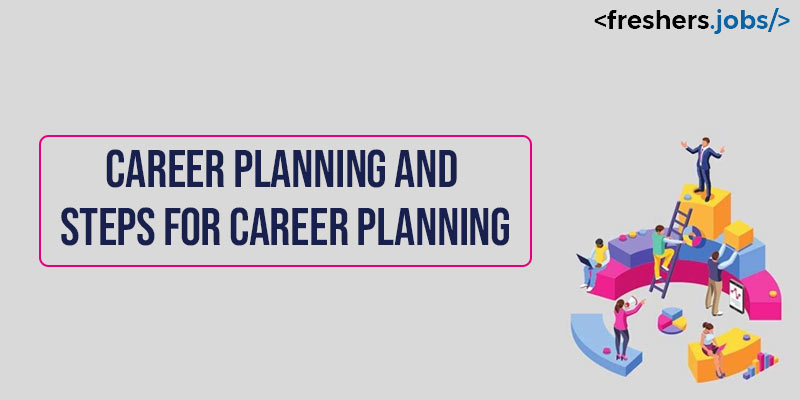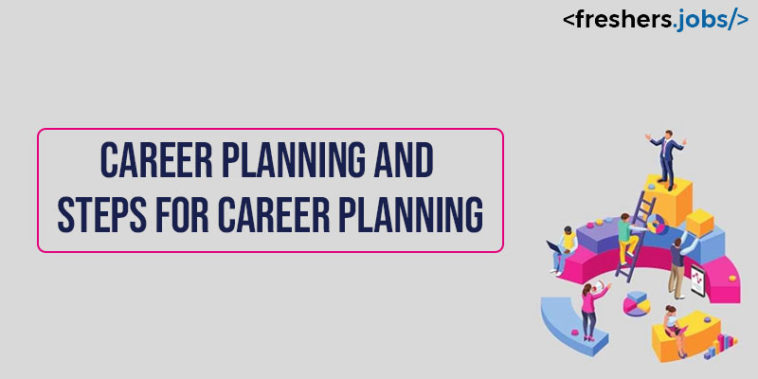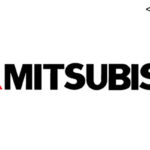The career-planning process helps you figure out your personal strengths and interests so you can find work that you will enjoy and be good at. This process is made up of a few simple steps that you can use over and over again throughout your career to make sure you are still working toward goals that make you happy.

In this blog, we look at What is career planning and steps in the process of planning a career and how to finish each one.
What is Planning for a Career?
Career planning is the process of finding ways to learn, train, and work that fit your interests, passions, and goals. Before you start looking for freshers jobs, you should make long-term goals that you can reach. These goals should tell you what you want to be doing in five, ten, fifteen, twenty, etc. years.
Then, between each stage, you can set short-term goals to make sure you have clear, doable steps to reach your long-term goals. When you plan your career for the career planning process, you can write down your goals and reevaluate them as you go. Hence you must know how to set goals and achieve them.
Steps in the process of Planning a Career
Depending on your path, you may only need to go through each step once or you may need to go through it again to change your mind and find new career options. Here is a list of the steps in career planning and development:
Looking at Yourself and Judging Yourself
Before you can make smart choices about work, you need to know your needs, strengths, personality, skills, talents, and interests. You can figure out these things on your own by making a number of lists or using a number of tests, such as
Value evaluations include things like how much money you want, how often you want to talk to other people at work, how much you want your work to help society as a whole, and how important prestige is to your work and the rest of your life. For easier communication, it’s good to know the importance of verbal communication.
Ability tests, which look at your skills and strengths. They can tell you if you need more training and help you decide if you want to start a whole new career.
You could also meet with a counsellor who helps people find jobs as career planning importance. A career counsellor’s job is to help professionals understand the factors that can affect their career choices and find options they might not have thought of before. A career counsellor may use exercises to help you figure out your skills, interests, communication and learning styles, and other things to help you learn more about yourself. Inculcate the essential new skills to learn to advance your career.
Research on a Career
After you know what your skills and interests are, you can do research to find out what kinds of jobs you might be interested in. Start with the list of roles and industries that your assessments give you, or make a list of the work environment, responsibilities, and opportunities for advancement that you want in your career as career planning benefits. Using these techniques, consider other jobs and industries you may want to look into.
Start doing more research by finding out the basics about each of the jobs on your list. Look at the general description of each job and general information about the job market, such as the freshers salary, common benefits, educational and training requirements, and the likelihood of getting hired after meeting all the requirements.
Continue to narrow down your list of possible careers by finding out what it’s really like to work in each field. Think about using your professional network to find people who are already in those roles and industries, or reach out to professionals on social media sites that are focused on careers.
You can also read reviews of companies for specific roles to learn as much as you can about the pros and cons of the field and know what is career planning. To do so, you must know how to research a company before joining.
Trying out different Jobs and Professions
After you have narrowed down your list of possible jobs, find ways to try out each one in person.
Informational interviews: If you want to work in a certain field, you could ask a professional in that field to sit down with you and answer your questions. You can find out about their education, training, first jobs, and other parts of their career path. An informational interview can also help you build your professional network in the industry you want to work. This could help you find a job in the future.
Job shadowing: Job shadowing is watching a professional at work for a day, a week, or another short amount of time. You could go to meetings with them or watch them show you how they do their normal work. During your time with them, you can also ask them questions to learn more about their career path.
Volunteering: Some organisations may let you do tasks that would be part of your ideal job as a way to get more hands-on experience. This can also help you figure out if you would enjoy working in that job, industry, or type of workplace as a career planning process.
Internships: Think about doing an internship to get more hands-on experience in the field. These chances are more likely to give you tasks that are more related to your role.
Part-time jobs: Many jobs can be done part-time and may have fewer requirements to get started. You can find them in certain companies you might want to work for and in jobs like assistants that are directly related to the job you want.
Find a role model in the field: It can be very helpful to watch a mentor with a lot of experience and listen to them talk about the real world of their job. You can use their career choices as a guide for your own planning to find steps that might work for you, too.
Courses: If you go to college or another form of higher education, you might want to take classes that relate to possible careers. Through projects and essays, these classes can give you basic information and training that can help you understand some of the basics of career planning and development.
As there are many different types of jobs and professions, you can tap into freshers jobs in Hyderabad for recent job openings.
Making Choices and Choosing a Career
Think about the pros and cons of all of your choices. You will need to think about a lot of things, like the possible balance between pay and fun, the pros and cons of moving, and the balance between work and life.
Go over all of your past research and any related experiences very carefully and put them in order of how important they are, from most important to least important. This strategy helps you put different factors and roles in order of importance so you can choose the best one. Think about other options that are still similar in case your goals change or your job search doesn’t lead you to that role.
Final Planning and Action
Put together everything you have learned and make a plan for what to do next. This plan should include information about your background, like your work history, education, level of training, volunteer work, and other unpaid experience. It should also have your professional licences or certifications, the results of the self-evaluations you did in the first section, and any advice you got from a career counsellor. Here are the best ways to advance your career development.
Make a list of all the short-term and long-term goals you need to reach before you can reach your final career goal as career planning importance. These lists should include all of the career, education, and training goals you need to reach to get to where you want to go with your career. You should also think about the things that could stop you from reaching your goals and how you plan to get around them. These barriers could be financial, educational, professional, or personal, like the cost of college, family obligations, or the need for tools and supplies for your chosen career.
Consider writing down each step of the career path you want to take, including the ones you have already taken so you can see how far you have come. You can also do this for your other options to make sure you are ready to go with them if your best option doesn’t work out.
Looking for a Job and Taking it
Start your job search by looking at your career plan. Find specific jobs and companies you would like to work for, and compare their preferences and needs to your career plan. Check to see if there are any more steps you need to take or if you are ready to apply for jobs alert.
You can also use your strategy for setting goals and your career plan to write a strong cover letter that shows how much you care about the job, the field, and the company. Your career plan can show the steps you have taken so far and show how good you are at setting goals and working hard to reach them. You can also use these things during the interview process to show potential employers that you are interested and qualified. To better perform for the interview you can know the interview tips for freshers.
What is career planning? If you get a job offer, check to see if the salary, benefits, location, work-life balance, and responsibilities match your self-assessment and action plan.



